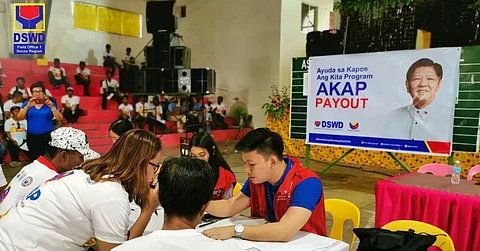
- NEWS
- the EDIT
- COMMENTARY
- BUSINESS
- LIFE
- SHOW
- ACTION
- GLOBAL GOALS
- SNAPS
- DYARYO TIRADA
- MORE

The Department of Social Welfare and Development (DSWD) on Sunday outlined safeguards for the implementation of the Ayuda Para sa Kapos ang Kita Program (AKAP), a new initiative aimed at cushioning the impact of inflation on low-income Filipinos.
AKAP, a late addition to the 2025 national budget, is designed to provide financial assistance ranging from P2,000 to P10,000 to minimum wage earners and near-poor households.
However, concerns have been raised that the program could be exploited for political gain ahead of the 2025 midterm elections.
Critics have decried the subsidies as potential “doles” that could be used to sway voters, drawing comparisons to “pork barrel,” the discredited discretionary funds for lawmakers that the Supreme Court has deemed unconstitutional.
To address these concerns, the DSWD said it has collaborated with the National Economic and Development Authority (NEDA) and the Department of Labor and Employment (DoLE) to develop a more robust standardized targeting system for beneficiaries.
In a statement, DSWD Secretary Rex Gatchalian said that a revised intake form will be used to better screen potential recipients.
“While DSWD social workers have always exercised prudence in screening beneficiaries through intake forms, interviews, and thorough document verification, the new form will specifically identify whether the applicant is genuinely affected by the effects of inflation,” Gatchalian said.
The agencies said the enhanced guidelines are intended to allay public concerns about AKAP and “ensure that only legitimate beneficiaries” receive assistance under the program.
Guidelines will include a cap on the number of household members eligible for AKAP aid to minimize the possibility of duplicate assistance.
They will also “include items that will explicitly state that the program is insulated from political manipulation, in accordance with the overarching mother guidelines of the DSWD and existing policies that insulate all government programs from politics.”
Past government aid programs, such as the DSWD’s Assistance to Individuals in Crisis Situations and the DoLE’s Tulong Panghanapbuhay sa Ating Disadvantaged/Displaced Workers, have seen politicians actively participating in distribution events.
“The consequences of fraudulent activities, such as the falsification of documents and beneficiary lists, and instances of misappropriated assistance will also be outlined in the guidelines,” the DSWD said.
Officials have agreed to maintain the referral system for potential AKAP beneficiaries, the DSWD said. However, referred clients and their documentation will still be subject to the agency’s rigorous vetting process.
NEDA Secretary Arsenio Balisacan said the agency will provide monitoring and evaluation of AKAP, adding that data from the Philippine Statistics Authority could be utilized to verify the number of minimum wage earners in a household.
Meantime, Labor Secretary Bienvenido Laguesma said his agency will provide information on potential beneficiaries, including the prevailing wage rates across the country.
